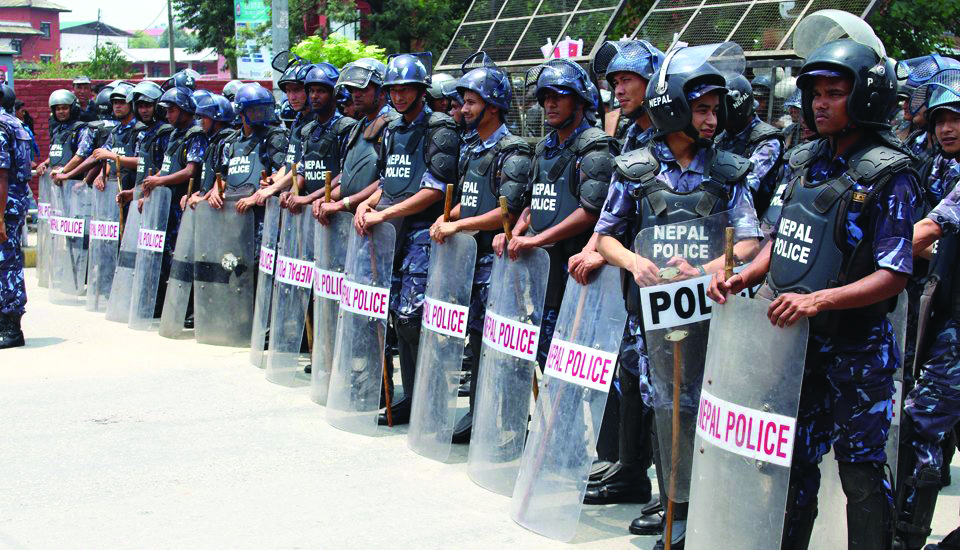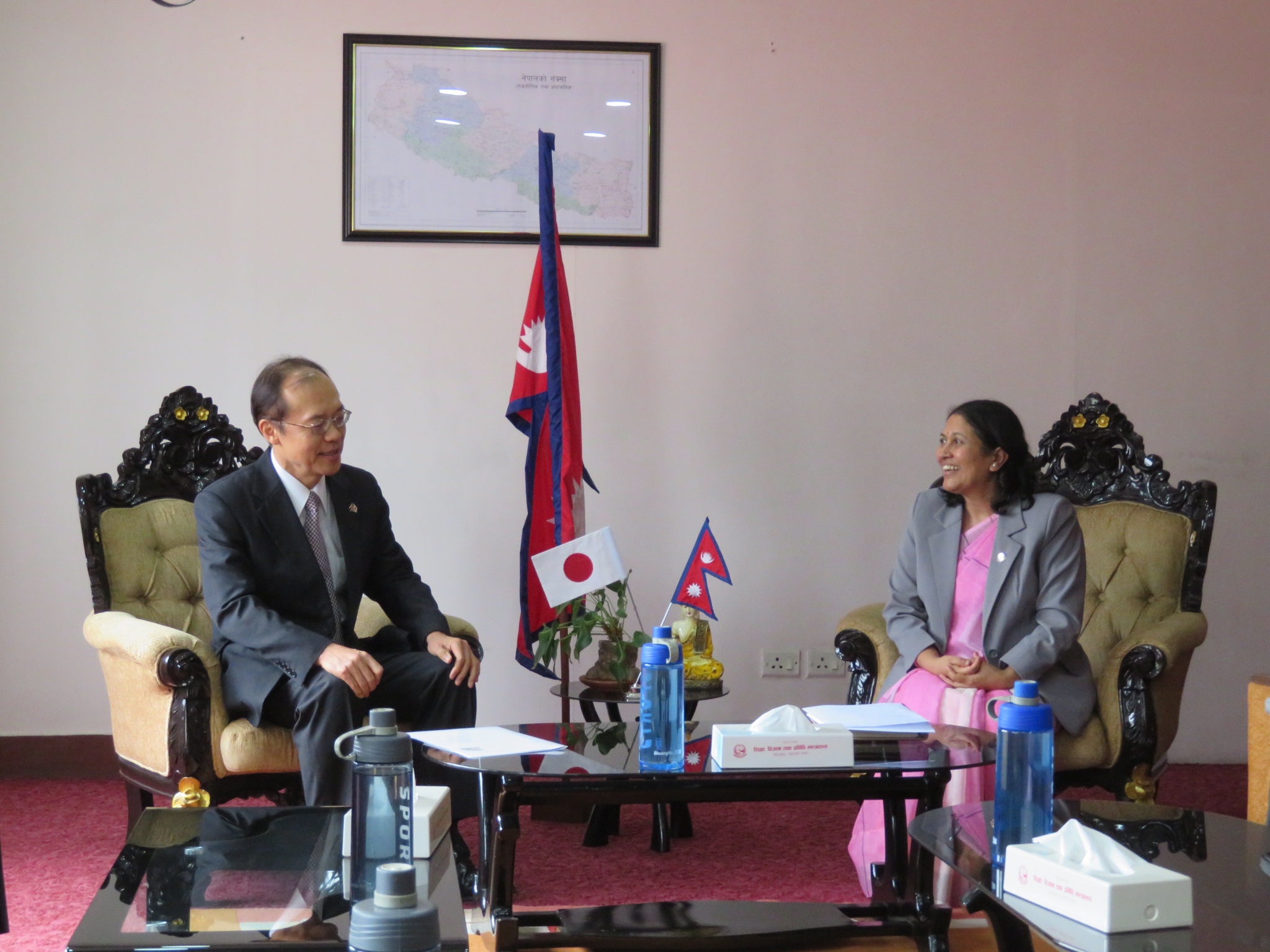
OR
Central govt reluctant to entrust police command control to provincial govts
Published On: November 29, 2023 04:30 PM NPT By: Tapendra Karki

KATHMANDU, Nov 29: The Nepal Police and Police Adjustment Act has not been implemented even four years after being approved by parliament. Although the Police Adjustment Act was approved by the President on February 11, 2020, it has been pending due to the central government's reluctance to implement it. The home ministers of the seven provinces have now come to Kathmandu “to plead with the central government” to implement the Police Adjustment Act. However, the possibility of immediate implementation appears low.
The home ministers of all seven provinces on Tuesday demanded with Prime Minister Pushpa Kamal Dahal and Home Minister Narayan Kaji Shrestha that the Police Adjustment Act be implemented. Although the prime minister and the home minister promised to implement the law, they refrained from providing a specific timeframe. The internal affairs ministers of all the seven provincial governments met Home Minister Shrestha in the afternoon and Prime Minister Dahal in the evening and demanded the implementation of the Police Adjustment Act. "The Prime Minister gave a positive response, we hope it will be implemented soon," said Bagmati Province Home Affairs Minister Ganga Narayan Shrestha after the meeting with Prime Minister Dahal.
During the meeting, Home Minister Shrestha mentioned that the government is going to create, amend and define the procedures necessary to empower the provinces and strengthen federalism according to the constitution, and said that the Police Adjustment Act will be implemented as soon as possible. He said that the implementation process will not be stopped as this matter aligns with the government's policies and programs. The Act was made to accommodate the police personnel within the provinces.
"However, the implementation of the Nepal Police and Province Police (Operation, Supervision and Coordination) Act, 2020 approved by the President in February 2020 has stalled due to the reluctance of the federal government and the police headquarters," said a source at the Ministry of Home Affairs.
After the enactment of the Police Personnel Adjustment Act, 2076 BS, the provinces welcomed the opportunity to make the provincial security system stricter and orderly. After the Police Adjustment Act was passed, the Organization Structure and Personnel Committee, chaired by the Secretary of the Ministry of Home Affairs, conducted an Organization and Management Survey (O&M). The committee had submitted a report to the Council of Ministers on how the distribution of powers, positions, and command control would be after the adjustment of the police force. The O&M was approved by the Council of Ministers on November 12, 2020, but it appears that the O&M is now ineffective.
In the adjustment process, the central police will be sent to the provincial level, but the government aims to retain command and control centrally. According to the Police Adjustment Act, each province's in-charge will be a Deputy Inspector General of Police (DIG) following the old pattern. The adjustment aims to mobilize police personnel without disrupting the provincial-level security structure. Although approved by the President on February 11, 2020, the federal government has been reluctant to implement the Police Adjustment Act. "Our point is that for the institutional strengthening of the provinces and strong federalism, the adjustment process of the provincial police should be completed quickly," emphasized Shrestha, the Minister of Internal Affairs of Bagmati Province.
The provincial governments have the constitutional right to maintain peace and security in the provinces and to control and investigate crime, but this right has not been utilized. Parliamentary elections have been held twice since the creation of the Constitution. During this period, different parties led the government several times, but the police could not be adjusted. Procedures and regulations prepared for the adjustment of the police force have been gathering dust at the shelves of the Ministry of Home Affairs as they could not be approved.
In the Police Adjustment Act, it is mentioned that adjustment process and details shall be decided within one month from the date of promulgation of the Act. But until now, due to the non-implementation of this Act, the provinces have not been able to use their constitutional right. In order to get the right, the ministers of internal affairs of the provinces had to come to Kathmandu to put pressure on the central government, and had to submit memorandums. The Madhesh government, which declared a protest against the federal government claiming that peace and security could not be strengthened due to the absence of provincial police, has already filed a case at the Supreme Court twice.
In the month of Shrawan (mid-July to mid-August) 2077 BS, it was decided to keep the three districts of Kathmandu Valley (Kathmandu, Bhaktapur and Lalitpur) under the center rather than under the province. These three districts, which were previously under the concept of metropolitan police, are now under Bagmati Province. But in terms of security, these districts are not considered a part of Bagmati Province. According to the officials of the provincial government, the Police Adjustment Act has stalled after the decision that the command of these three districts should be taken over by the Central Police Office. "Kathmandu, Bhaktapur and Lalitpur are part of Bagmati Province, but the command of the police is done by the police headquarters. It was not a suitable issue and decision,” said an official of Bagmati Province.
According to the Police Administration Act, usually, in each district, the leadership of the police organization is held by a Superintendent of Police (SP). Currently, in the hilly districts, a Deputy Superintendent of Police (DSP) is designated as an in-charge. An SP will be in charge of the hill district where the Police Adjustment Act has been implemented. Similarly, according to the law, the chief district officer of each district will mobilize the police. There will also be promotion and transfer of police within the province.
You May Like This

NC district presidents demand province govt to prioritize health sector
GANDAKI, June 15: Eight district presidents of Nepali Congress (NC) from Gandaki Province have demanded the provincial government to prioritize... Read More...

Provincial govts struggle to boost capital expenditure
KATHMANDU, Dec 18: While the newly-implemented federal system of governance was expected to expedite development works, budget spending figures of provincial... Read More...

Government's lax attitude hurts tourism businesses in Province 5
BUTWAL, Dec 5: Four months ago, existing tourism offices in Bhairahawa of Rupandehi district and Nepalgunj of Banke district were... Read More...











Just In
- Nepal at high risk of Chandipura virus
- Japanese envoy calls on Minister Bhattarai, discusses further enhancing exchange through education between Japan and Nepal
- Heavy rainfall likely in Bagmati and Sudurpaschim provinces
- Bangladesh protest leaders taken from hospital by police
- Challenges Confronting the New Coalition
- NRB introduces cautiously flexible measures to address ongoing slowdown in various economic sectors
- Forced Covid-19 cremations: is it too late for redemption?
- NRB to provide collateral-free loans to foreign employment seekers







Leave A Comment